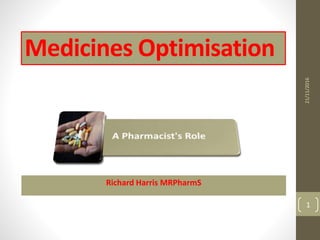Oxford medicines optimisation presentation
This document discusses medicines optimisation, which aims to identify, intervene, and resolve issues with adverse medication performance, inappropriate prescribing, and non-compliance. The goal is to improve treatment outcomes for patients, improve value for the NHS, and ensure optimal and safe treatment based on evidence. Pharmacists can contribute by ensuring safe prescribing adheres to best practices, assessing drug histories for issues like polypharmacy, optimizing drug therapy, providing medication education, and coordinating information for patients. A case study examines a high-risk elderly patient taking multiple medications and proposes recommendations like reviewing medications like diuretics and shorter-acting benzodiazepines to reduce falls risk.

Recomendados
Recomendados
Mais conteúdo relacionado
Mais procurados
Mais procurados (20)
Destaque
Destaque (20)
Semelhante a Oxford medicines optimisation presentation
Semelhante a Oxford medicines optimisation presentation (20)
Mais de Richard Harris
Mais de Richard Harris (7)
Último
Último (20)
Oxford medicines optimisation presentation
- 1. Medicines Optimisation Richard Harris MRPharmS 21/11/2016 1
- 2. Medicines Optimisation Aim Identification, Intervention and Resolution of adverse medicines performance, inappropriate prescribing and compliance issues Improve Treatment Outcomes for Patients Improve value for money for the wider NHS Improve quality, safety & optimal treatment outcomes based on best evidence Patient Engagement 21/11/2016 2
- 4. 21/11/2016 4 How Can Pharmacists Contribute ? Ensure safe prescribing & administration of medication that adheres to best evidence & practice Cost effective-QIPP drop lists -drugs of limited clinical value Assess Drug History & Monitor for Polypharmacy/ prescribing cascades & ADEs-Document-Communicate-Challenge Optimise Drug Therapy- Switching/ patent expiry Medicines waste campaigns e.g. patient education awareness Medicines Optimisation Training (MDT/GP Practices/ Care Homes) Provide co-ordinated medicine information to patients/carers/relatives as part of the discharge-planning process
- 5. 21/11/2016 5 Case study - Elsie 78 • Recently discharged from hospital after a fall • She lives alone • Elsie says her mobility and eye sight are getting worse. • Takes Furosemide 40mg BD –doesn’t like ‘water tablet’ • Recently prescribed Nitrazepam to help poor sleep. • Reports feeling thirsty What Are The Risk Factors? • Age • Falls history • Adherence concerns-cognitive/physical • New medication • Undiagnosed disease? • Isolation Supporting Medicines Optimisation & reduce further falls • Is diuretic suitable? Consider recommending an alternative • Switch to a shorter acting benzodiazepine e.g. Zopiclone - consider cessation • Increased thirst may suggests undiagnosed diabetes-referral • Is Elsie managing to take her tablets OK on her own?- Ask the patient-check her medicines with her-advise on correct use - consider compliance aid • Wider question over independence : Engage with MDT/arrange care package
- 6. 21/11/2016 6 Case Study : Omega 3 Low Priority Poor Value The NHS Midlands and East spent £2.5 million on omega-3 fatty acids compounds in 2012-2013 Source: PrescQIPP Bulletin 47 October 2013 NICE Guideline-Evidence base PrescQIPP Drop List Letter of Advice/PIL to Patient Agree protocol/process Audit practice/patients Monitor savings - summary report Omacor I capsule daily = 28 day saving of £14.28 Medicine Stopped Pharmacist CCG Medicines Review Optimisation
- 7. 21/11/2016 7 •Prioritise: • Engage the patient in the process •Aim: • Keep regimes as simple as possible-reduce pill burden •Modify: • Make recommendations including cessation- “is the drug still needed?” •Prevent : • Adherence issues-check patient understanding, Identify & resolve barriers, explain & monitor changes Presentation Summary
Notas do Editor
- Helping care home rehabilitation staff with medicines management
- Rivastigmine Patch Switch where appropriate to capsules-cost saving
- Step one: Agree protocol Step two: Patient identification and data collection Step three: Exclusion criteria – patients NOT suitable/eligible for stopping prescribing of omega-3 fatty acid compounds Step four: Stop prescription for omega-3 fatty acid compounds in reviewed patients Step five: Summary report to GP practice Step six: Follow up
